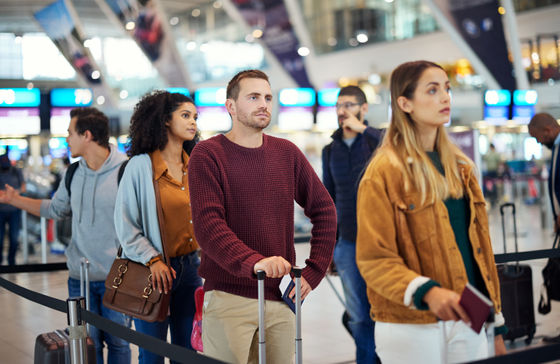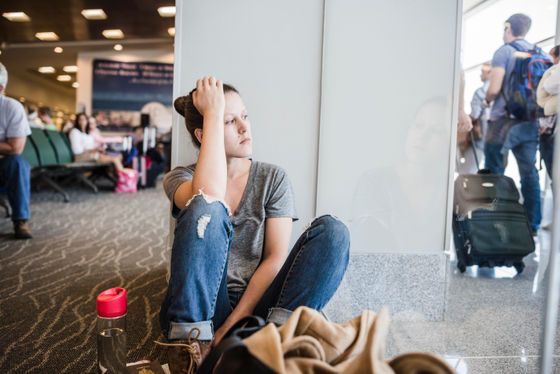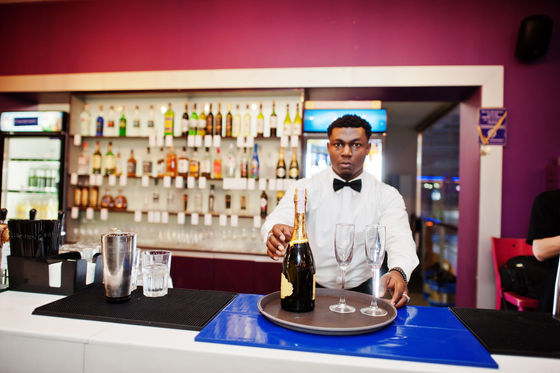Psychologist explains why we often see strange behavior at airports

In airport lobbies and on airplanes, various strange behaviors are witnessed, from harmless behavior such as lying on the floor or starting yoga, to ridiculous behavior such as getting drunk and causing trouble in the morning or trying to open the door of a passenger plane in flight. Steve Taylor, a psychology professor at Leeds Beckett University in the UK, explains why people do things they normally don't do at airports.
The weird psychology of airports
◆Travel is out of the ordinary
Taylor says one reason airports are prone to problems is because they're where the adventure begins for vacationers and holidaymakers who are eager to get off to a spectacular start on their exciting journey.

On the other hand, there are also people at the airport who are anxious about flying, which may cause them to become different people or turn to alcohol for relief.
Furthermore, the congestion and noise of airports add to the irritation. As proven in the field of environmental psychology, humans are very sensitive to their surroundings and can easily lose their composure due to stress factors such as congestion and noise.
Anxiety and stress make people nervous, and anxious people tend to feel anger more easily, Taylor said, and these factors often lead to angry outbursts.
◆ Boundaries become blurred at airports
Taylor also believes it is necessary to look at airports from the perspective of 'psychogeography,' the study of how places, especially urban environments, affect people's emotions and behavior.
To explain the unique location of airports, Taylor introduces the Celtic concept of 'thin places.' The Celts believed that in these thin places, where the boundary between the material world and the spiritual world is unclear, people were 'both in and neither.'

In Celtic culture, the gap was a sacred grove or a stone circle, but in today's technological society, an airport can be considered a gap, because it is literally a crossroads, and once you pass through security, you are in
Airports also blur the concept of location, and crossing the border between two time zones also blurs the concept of time: for example, a flight leaving Atlanta at 15:00 and arriving in Alabama at 14:50 may arrive earlier than it departs.
While traveling back and forth in time like this can give you a sense of control over your life, the sense of loss that comes with arriving at the airport and it being over can lead to other feelings of anxiety.
In another sense, Taylor points out, airports are 'zones of absence,' where the present moment isn't welcome. In other words, everyone there is only thinking about their flight and the adventures that await them on the way. This preoccupation with the future can lead to intense frustration, especially when flights are delayed.

From another perspective, the boundaries between people become fluid at airports. Not only 'antisocial behavior' is observed at airports, but also 'prosocial behavior' in which strangers have intimate conversations that would normally be unthinkable, such as discussing travel and vacation plans. This is because the social constraints of everyday life do not apply in no-man's land such as airports.
Alcohol can act as a lubricant in these interactions, but it can also add fuel to the fire if trouble occurs. For this reason, Ryanair, an Irish low-cost airline, is calling for passengers to limit their alcohol consumption to two drinks at airport bars in order to prevent drinking-related troubles on board.
Thus, airports can make people feel disoriented and lost, as their definitions of place, nationality, and time become blurred. Whether caused by psychological or environmental factors, this

◆ Sense of freedom
On the other hand, airports can also have a positive side: they can provide a release from the everyday. In his book, Time Expansion Experiences , Taylor argues that 'we see time as an enemy, a deadline that threatens to rob us of our lives.' So being in an airport, where time becomes blurred, can feel like being released from a prison.
And while identity is important to our mental health, it can also be a constraint, so the freedom that comes with an airport or a foreign adventure can be an exhilarating escape from everyday life.
In this way, the feelings of anxiety and relief experienced at airports can lead people to behave in ways they would not normally do.
In Sigmund Freud's theory, this can be interpreted as a transition from the normal, civilized ego to the primitive, instinctual part of the psyche , the id . According to Freud, the id is the source of a person's desires, impulses, emotions and aggression, and it demands immediate gratification. The id is usually kept in check by the ego, but when this check is relaxed, especially by alcohol or drugs, there is a risk of escalating behavior.

Regarding the restriction of drinking at airports, Taylor expressed understanding, saying: 'Some would say banning alcohol at airports goes too far, but given the many factors that contribute to anti-social behaviour at airports, it is difficult to come up with any other solutions. In a situation where boundaries are breaking down and risk escalating into violence, drawing a legal line may be the last hope.'
Related Posts:
in Vehicle, Posted by log1l_ks







